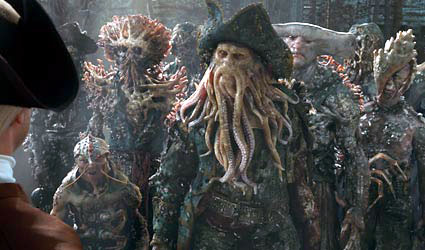Alumnus Michael Bunnell wins an Oscar for making
computer-generated characters look more real
Michael Bunnell wins Sci-Tech Oscar for the development of point-based rendering for indirect illumination and ambient occlusion.
Michael Bunnell graduated from SMU in 1985 with degrees in Computer Science and Engineering. What is now the Bobby Lyle School of Engineering gave him two very nice diplomas: but it’s his 2010 Sci-Tech “Oscar” that now has the place of honor on the shelf over his TV.
Bunnell’s work has made him a local hero in Hollywood, where computer- generated animation is now an integral part of even the simplest movies. If you’ve seen the last two Pirates of the Caribbean movies, Wall-E, or Batman: The Dark Knight, then you’ve seen his work.
Bunnell’s film industry contribution is known as “point-based rendering for indirect illumination and ambient occlusion,” techniques used for “color bleeding” and shadowing. When a computer-generated character stands next to something colorful, and the color of that object or its shadow is realistically reflected on the character’s face – that’s color bleeding.
When it’s done right, Bunnell said, it looks like reality. When it’s not right, he says, your reaction will be, “That’s pretty good computer generation.” Rudimentary color bleeding and shadowing technology was available before Bunnell, but his digital innovation allows filmmakers to get the job done quickly.

“The first time I heard they’d used my technique was six months after the movie came out,” Bunnell explains. “Dead Man’s Chest” won the “Oscar” for visual effects and Bunnell recalls thinking at the time, “That was the closest I was going to get to winning any Oscars.”
The Academy of Motion Picture Arts and Sciences’ Scientific & Technical Awards are conferred in recognition of original developments that result in significant improvements in motion picture production and exhibition. Bunnell received his “Sci-Tech Oscar” Feb. 20 in Beverly Hills, honored with colleagues Christensen and Hery for the development that has become an industry staple in the last few years. Each man was awarded a 24k-gold-plated plaque decorated with the familiar figure of “Oscar” carved in bas-relief.
Bunnell joins a small group of SMU alumni who have known Oscar personally: Kathy Bates ('69) received the Academy Award for Best Actress for her 1990 role in "Misery"; Dorothy Malone ('45) received the award for Best Supporting Actress for her 1956 role in "Written on the Wind"; and Milton Justice ('68) co-produced "Down and Out in America," which won the award for best documentary feature of 1986.
Bunnell has his own video game development company, Fantasy Lab, based in the San Francisco Bay area.
# # #